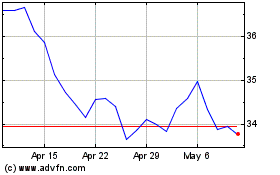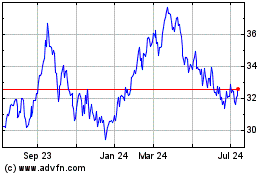Some New Cars Use Recalled Air Bags -- WSJ
June 02 2016 - 3:05AM
Dow Jones News
By Mike Spector
At least four auto makers confirmed equipping new vehicles with
defective Takata Corp. air bags that eventually will need to be
replaced, according to Democrats on a U.S. Senate panel, further
spotlighting government officials' challenges in tackling the
largest automotive recall in the nation's history.
Toyota Motor Corp., Fiat Chrysler Automobiles NV, Volkswagen AG
and Mitsubishi Motors Corp. have all confirmed equipping some new
vehicles with rupture-prone Takata air bags that lack a drying
agent, according to a report from U.S. Senate Commerce Committee
Democrats. Those air bags, linked to the lion's share of deaths and
injuries from ruptures, are legally allowed to be sold in vehicles
but must be recalled by the end of 2018.
The Takata air bags use ammonium nitrate as a propellant in
inflaters, a chemical that can destabilize amid prolonged exposure
to moisture and heat, leading to explosions that spray shrapnel in
vehicle cabins. The inflaters become riskier with age, officials
have said. The safety problem is linked to at least 11 deaths and
more than 100 injuries world-wide.
Nearly 70 million air bags are being recalled in the U.S. after
a recent expansion that included devices without a drying agent to
prevent moisture from building. The U.S. National Highway Traffic
Safety Administration is coordinating the recalls, prioritizing
states where air bags are most at risk of exploding. Regulators are
monitoring Takata and can order additional recalls under certain
circumstances. Officials have said some air bags will have to be
replaced more than once as newer devices, still deemed problematic,
replace older, riskier air bags in the interim.
Meanwhile, federal car-safety regulators slapped a Chevrolet
dealership in Arizona with a $40,000 fine after a two-year probe
found that it sold recalled vehicles that hadn't been repaired,
violating U.S. law, according to documents posted on the NHTSA
website. Regulators said the dealership has improved
procedures.
Dealer operator Jerry Moore said the Chevrolet dealership fixed
a flaw that regulators had uncovered and had agreed to move
forward. He added that many GM dealers were at the time overwhelmed
with recalls. Automotive News reported earlier on the
settlement.
Taken together, the actions furthered an unprecedented U.S.
government crackdown on the auto industry for safety lapses that
have prompted congressional hearings, investigations and financial
penalties. In November Takata agreed to fines for failing to alert
regulators to defective air bags in a timely manner as legally
required, and the company faces further penalties depending on the
outcome of a U.S. Justice Department probe. Takata has said it is
cooperating with government officials.
Wednesday's report on faulty air bags was released by Sen. Bill
Nelson (D., Fla.) a persistent critic of Takata and car-safety
regulators' handling of widespread recalls affecting the safety
devices. It found that Toyota expects to produce roughly 175,000
vehicles with the defective air bags starting from this past March
and ending in July 2017.
At least one current Fiat Chrysler model contains a front
passenger-side air bag that uses an inflater lacking a drying
agent, the report found. The Toyota and Fiat Chrysler models
weren't specified.
The report cited a handful of models with defective air bags
lacking a drying agent. They are the 2016 and 2017 Mitsubishi
i-MiEV; 2016 Volkswagen CC, 2016 Audi TT and 2017 Audi R8. Audi is
Volkswagen's luxury unit. An Audi spokesman said Volkswagen
launched a recall in February and is following regulatory
guidelines to replace certain Takata air bags.
A Fiat Chrysler spokesman said the company isn't equipping any
new vehicles with parts under recall. A Toyota spokesman said the
car maker is phasing out the use of Takata air-bag inflaters
lacking a drying agent in vehicles currently being built.
Mitsubishi is working with another supplier to develop replacements
for the air-bag inflaters in the two models lawmakers mentioned,
with a recall expected in early 2017 once parts are available, a
company spokesman said.
"Takata deeply regrets the incidents associated with its air-bag
inflaters and is working aggressively to address the situation," a
spokesman for the Japanese supplier said.
The report found that more than 2.1 million replacement air-bag
inflaters containing ammonium nitrate without a drying agent had
been installed in U.S. vehicles as of March. Democratic lawmakers
suggested that sales of vehicles with those air bags be stopped
until they are repaired.
The report also faulted lagging repairs to vehicles with
defective air bags and urged Takata, regulators and auto makers to
increase supply of devices that don't use ammonium nitrate. More
than 70% of replacement air-bag inflaters are currently coming from
manufacturers besides Takata, a U.S. official said.
A NHTSA spokesman called the air-bag recalls urgent and agreed
repairs should be done faster. "While the agency recognizes there
are constraints due to the size and complexity of the recall, NHTSA
has called on auto makers to do more to find and fix vehicles more
quickly," the spokesman said.
Honda Motor Co., Takata's largest customer, initially said
17,000 new vehicles were equipped with air-bag inflaters lacking a
drying agent, the report said. But in a more recent discussion with
lawmakers, Honda said no new vehicles were or would be equipped
with such inflaters. A Honda spokesman said no current Honda or
Acura vehicles for sale in the U.S. are being built with Takata
air-bag inflaters lacking a drying agent.
Write to Mike Spector at mike.spector@wsj.com
(END) Dow Jones Newswires
June 02, 2016 02:50 ET (06:50 GMT)
Copyright (c) 2016 Dow Jones & Company, Inc.
Honda Motor (NYSE:HMC)
Historical Stock Chart
From Mar 2024 to Apr 2024

Honda Motor (NYSE:HMC)
Historical Stock Chart
From Apr 2023 to Apr 2024
